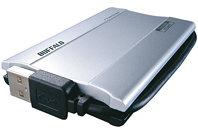Polaris573
Senior Moderator
- Joined
- Feb 26, 2005
- Messages
- 4,268 (0.57/day)
- Location
- Little Rock, USA
| Processor | LGA 775 Intel Q9550 2.8 Ghz |
|---|---|
| Motherboard | MSI P7N Diamond - 780i Chipset |
| Cooling | Arctic Freezer |
| Memory | 6GB G.Skill DDRII 800 4-4-3-5 |
| Video Card(s) | Sapphire HD 7850 2 GB PCI-E |
| Storage | 1 TB Seagate 32MB Cache, 250 GB Seagate 16MB Cache |
| Display(s) | Acer X203w |
| Case | Coolermaster Centurion 5 |
| Audio Device(s) | Creative Sound Blaster X-Fi Xtreme Music |
| Power Supply | OCZ StealthXStream 600 Watt |
| Software | Windows 7 Ultimate x64 |
Buffalo Unveils a 100 GB Flash Drive
Although we've seen flash SSDs that top out at 416 GB, nothing in the mainstream is really bigger than 64 GB -- but Buffalo's new SHD-UHRS series seems like it's bringing the status quo up to 100 GB. The USB 2.0 external drive uses two different types of flash memory to reach that capacity, yet it's only about the size of a business card and weighs just two ounces. Those of you somehow entranced by the case design but lacking the 952 USD for the 100 GB model needn't worry, however: Buffalo is also shipping a 32 GB version for a pretty competitive 312 USD and a 64 GB model for 665 USD.

View at TechPowerUp Main Site
Although we've seen flash SSDs that top out at 416 GB, nothing in the mainstream is really bigger than 64 GB -- but Buffalo's new SHD-UHRS series seems like it's bringing the status quo up to 100 GB. The USB 2.0 external drive uses two different types of flash memory to reach that capacity, yet it's only about the size of a business card and weighs just two ounces. Those of you somehow entranced by the case design but lacking the 952 USD for the 100 GB model needn't worry, however: Buffalo is also shipping a 32 GB version for a pretty competitive 312 USD and a 64 GB model for 665 USD.

View at TechPowerUp Main Site
Last edited by a moderator:







 .
.